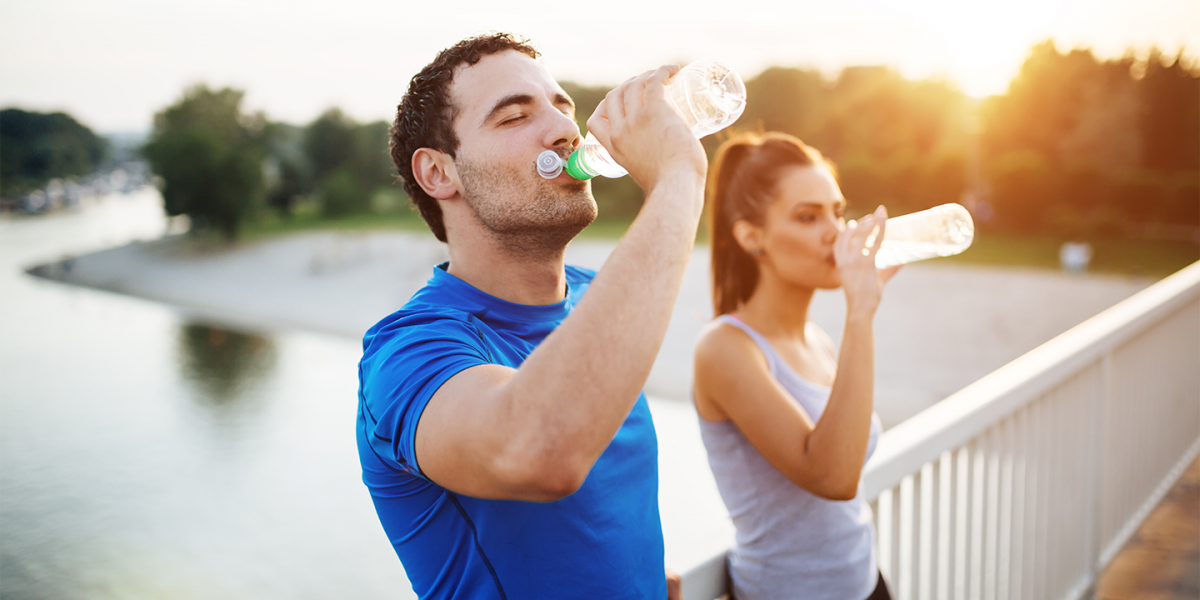Dehydrated runners cannot achieve the results they are capable of. With suitable hydration, up to five minutes can be gained in a race.
For “normal” running, it is usually sufficient to drink by feel. There is no immediate need for supplements in the form of carbohydrates or electrolytes. However, for longer and more intense efforts, they can be quite useful to postpone fatigue and / or reduced performance due to lack of energy.
The reduction in performance caused by a lack of fluids actually only plays a role in competition or in competition-specific training. It comes into effect from a weight loss due to fluid loss of more than two percent of body weight.
Runners who consume sufficient fluids containing electrolytes and carbohydrates are on average about four to five minutes faster in competition and they suffer less from muscle cramps.
It is best to drink according to a previously calculated plan. With four to eight deciliters per hour, the requirement varies greatly from individual to individual. It depends directly on whether you sweat heavily or lightly. To know your needs, it is best to weigh yourself before and after running. It is important that you test the scale beforehand, for example by weighing yourself with a 0.5 and a 1.5 liter PET bottle and see if it shows the difference.
How to calculate how much to drink
With this knowledge and a good drinking quantity calculator, for example on the website of the “Swiss Sports Nutrition Society”, you can determine your individual need for fluid – which of course also depends on the temperature and the exertion.
Drinking more than one liter per hour makes no sense, because the stomach allows a maximum of 1.2 liters per hour to pass through it and a maximum of one liter of fluid can be absorbed from the small intestine every hour. As a rule of thumb, drink a few small sips every ten to 15 minutes.
Your goal should be to avoid dehydration as well as “overhydration.” If you weigh more after crossing the finish line than you did at the start, you’ve drunk more along the way than was lost through sweating.
Replace sweated-out salt and other electrolytes
Amateurs in particular often overestimate their fluid needs and drink too much. This also reduces performance because the athlete is then carrying unnecessary weight. Under certain circumstances, too much fluid can cause gastrointestinal problems, and in extreme cases it can even be dangerous if vital electrolytes such as sodium are “diluted” in the body by too much water.
Therefore, it is important to also replace the salts that the body loses when sweating. Be it with the sports drink, with electrolyte solutions or, with diluted fruit juice with a pinch of table salt. Slightly hypotonic drinks are absorbed most quickly. This means that slightly fewer particles (for example, sugar and salt) are dissolved in them than in the blood.
When carbohydrates in drinks are useful
Drinking in sports does not only have the goal of fluid replacement, but also of energy supply. If you are training to lose weight, sugared drinks or those containing other carbohydrates are counterproductive. You can also do without them when training for basic endurance.
Carbohydrate-containing drinks are useful, however, if you want to supply yourself with energy. For example, in order to be able to call up the maximum performance in the second half of a competition. During long competitions, the energy requirement is sometimes higher than the body can draw from fat and glycogen reserves (glycogen is the storage form of sugar/carbohydrates).
In order to maintain performance, you can then supply yourself with carbohydrates mainly in the form of glucose (dextrose) and, in the case of prolonged exertion, in combination with fructose (fruit sugar) via drinks. However, the body cannot absorb as much energy as it would theoretically need. When running, a maximum intake of around 60 grams of carbohydrates per hour is calculated.
Tips
- The best basis for a home-mixed sports drink is water or fruit tea. Fruit juices are often less well tolerated. Recipes can be found, for example, on the website of the “Swiss Sports Nutrition Society”. A very simple recipe is: 1/3 liter of orange or apple juice, 2/3 liter of water, 1 pinch of salt and some maltodextrin.
- Beverages at a moderate temperature are best tolerated.
- Simply rinsing the mouth with a carbohydrate-containing drink (“mouth rinsing”) has a positive effect on energy availability. However, it should last at least five seconds, which is hardly possible during intense running.
- Think about your teeth, too: drinks with a pH value of 5.5 or lower attack tooth enamel. Since they are drunk in sips and stay in your mouth longer, it’s bad for your teeth if you drink sweet drinks all the time, or acidic ones (i.e., with a low pH below 7). Sports drinks based on syrup are therefore unsuitable.
- Drinks containing caffeine can be useful, especially towards the end of a competition, because the caffeine improves concentration and lowers the error rate. Energy drinks are unsuitable because of their high sugar content.
- Alcoholic drinks are not a good idea in competition or before training because they increase the risk of falls and injuries. After training or competition, alcohol should be avoided for optimal recovery. Alcohol hinders recovery and rehydration, impairs sleep in the second half of the night, and has negative effects on your immune system.
- In extreme heat, it may be better to pour water over your head rather than drink copious amounts.
- The body learns over time to limit salt loss when sweating. If you notice salt marks on your clothes, salt loss was high. You can “get back in” the electrolytes you sweat out, especially sodium, not only with drinks, but also with a balanced, healthy diet.
Who ist Medbase?
Medbase is the largest multidisciplinary sports medicine network in Switzerland and offers specialized sports medicine services for athletes, clubs and sports associations of all activity levels in the fields of sports medicine, sports physiotherapy, performance diagnostics and training advice.



